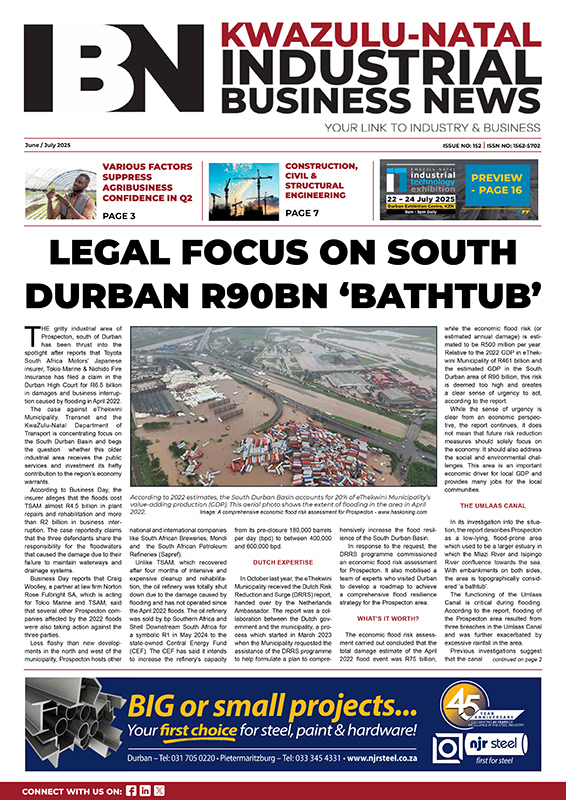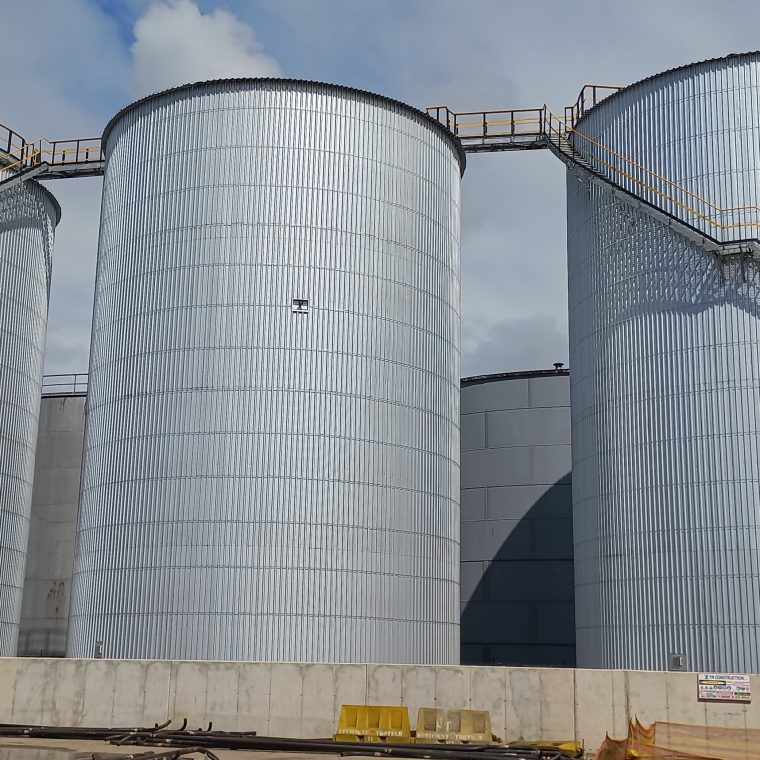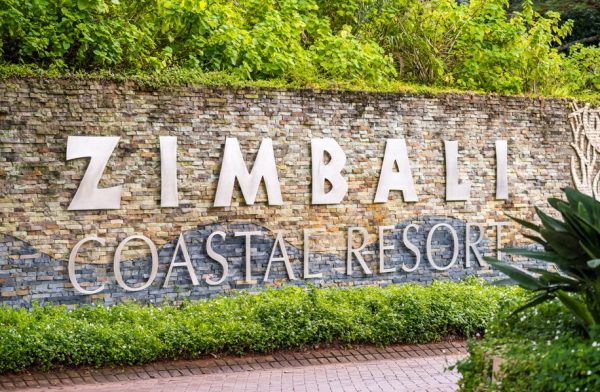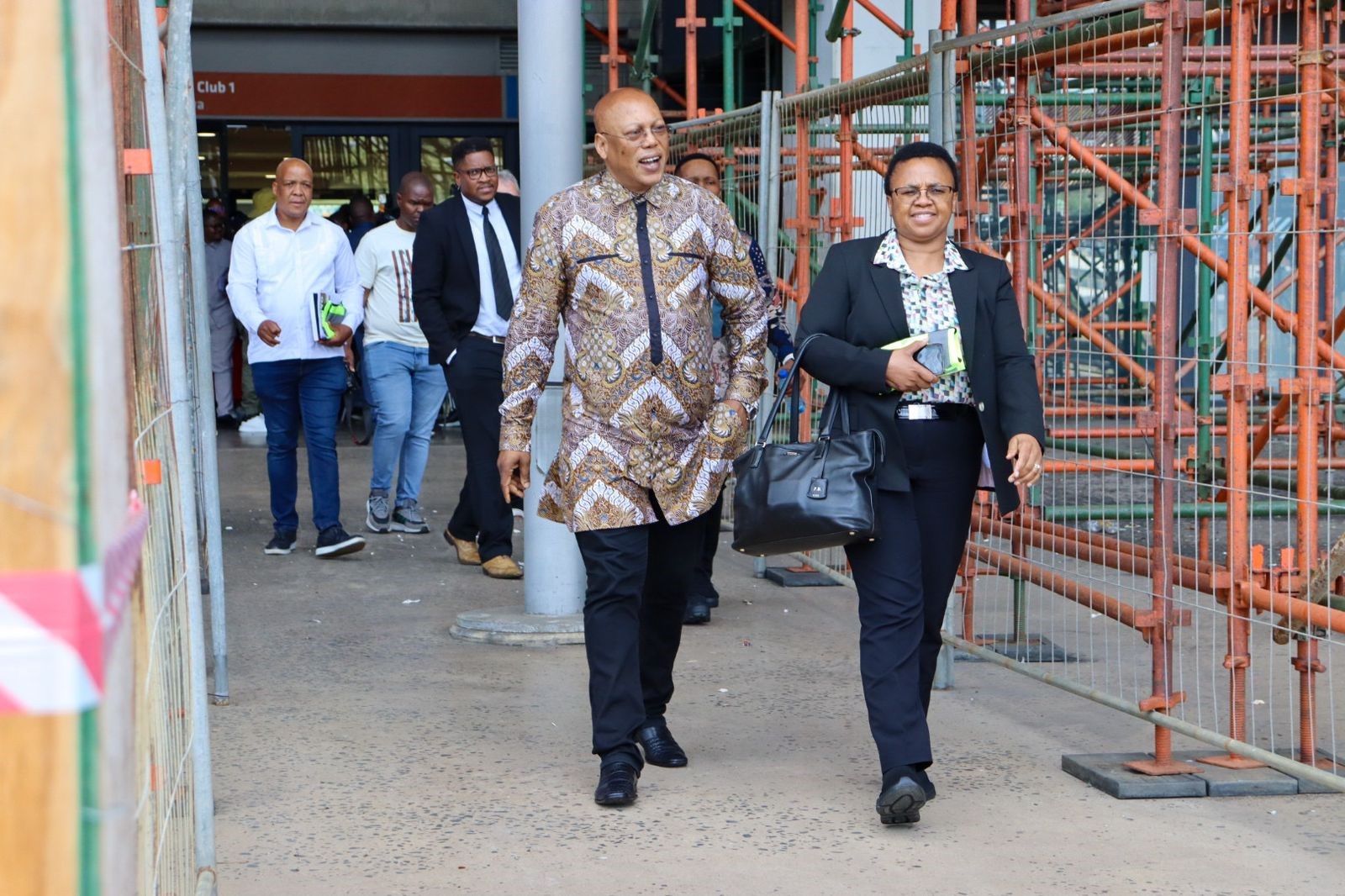NO longer dominated by a handful of multinationals, the South African fuel market is opening up to new entrants. Central Energy Fund group chairperson Ayanda Noah said in October last year that it is anticipated that 53% of refined fuel products will be imported into South Africa by 2025, amounting to 604,000 barrels per day. There are six fuel refineries in South Africa, but only three are operational and imported refined products are filling the gap.
This has opened the market to more companies which can import fuels, including marine fuel and industrial fuel oil as well as oil by-products like bitumen. Storing petrochemicals remains highly regulated in South Africa and operators require a National Energy Regulator of South Africa (Nersa) license.
Durban-based FFS Refiners, well-known for its oil recovery services is making moves in this competitive market. In 2022 FFS Refiners acquired the OiltankingGrindrodCalulo’s (OTGC) tank terminal business.
“The company was renamed FFS Tank Terminals, to establish an independent, South African-owned tank terminal business,” says FFS Refiners CEO, Andrew Canning.
FFS has been operating bunkering services in the Port of Cape Town for 20 years and FFS Refiners’ Marine Division plans to fulfil its first bunkering order in Durban next month. Earlier this month, Transnet National Ports Authority (TNPA) announced FFS Tank Terminals as the preferred bidder for a Build Own Operate Transfer (BOOT) agreement at the Port of Richards Bay.
Canning says, “The Joint Bunkering Services (JBS) site in Richards Bay will ensure we have a strong presence in the country’s three key ports. It will allow us to offer third-party storage to customers providing long-term annuity income whilst also providing an opportunity for FFS Refiners’ own business divisions to grow.” FFS Marine, a division of FFS Refiners, supplies maritime fuels to local and international fleets.
Richards Bay
The JBS BOOT tender process commenced in September 2022 with a Request for Proposals issued by TNPA. The awarded tender allocates four months for the transfer of operations to FFS Tank Terminals from the current operator, Engen. The brownfields 25-year concession is possibly the first of its kind to be awarded in many years.
Canning says that the purchase offer for the asset is R58 million and the company expects to invest another R75 million to refurbish and expand the facility. “The site is fifty years old and the priority will be to bring it up to current environmental standards. Pipelines from the berth to the JBS need to be refurbished and the existing tanks will be retained.”
Mindful of the 25-year timeframe, the company is looking at developing a second phase with additional storage. “It is likely that some of the new storage will be designed to cater for low-carbon fuels to assist with international shipping’s commitments to CO2 reduction via the transition to low-carbon fuels such as biofuel and green ammonia.”
“In January 2024 we completed three new Bitumen tanks at Maydon Wharf in the Port of Durban using our own engineering and project teams, subcontracting specialist services such as tank building to local enterprises and the same model is envisaged for Richards Bay.”
Richards Bay port master plan
According to TNPA’s port master plan, “Richards Bay aspires to be a premier dry bulk and liquid bulk port with diversification in other segments”. The JBS is located in the South Dunes Precinct, along with the proposed new Liquid Natural Gas (LNG) terminal being developed by Vopak and Transnet.
The JBS site is next to the coal terminal. “Access to the site will be a challenge as it is currently very congested with coal trucks. Berth occupancy is high and we will need to provide an agile solution to ensure we can provide on-tap fuel for our shipping customers. We look forward to working with TNPA to address these challenges,” Canning says.
The Port of Durban – Maydon Wharf
With most of the imported petroleum products going to the major oil companies’ tanks at Island View, importing and evacuating bitumen became a challenge in the Port of Durban. “Bitumen is not permitted to be stored at Island View as it requires heating to a temperature higher than 150C and this poses a fire risk to petrol and diesel storage in that area,” explains Canning.
“To assist the local road construction industry, TNPA temporarily accommodated ‘ship-to-truck’ operations at Maydon Wharf when Sapref closed in 2022. This operation poses HSE risks in that bitumen is loaded directly from a ship into a road tanker. It is also a slow operation, congesting the berths at Maydon Wharf, and ultimately adding to the cost of building and fixing roads,” says Canning.
“FFS identified this problem as an opportunity and decided in 2022 to construct a new bitumen storage facility. The new storage provides the only facility for the bulk import of bitumen from a ship, via a heated pipeline into three 2,500m³ storage tanks. A ship can be safely discharged within 24 hours, proving a safe cost-effective solution for our customers. The project was completed within budget and, had it not been for an extremely wet December, within schedule.”
The bitumen is stored at 150°C using thermal oil from a fired heater. “All tanks are insulated, including the bases of the tank which are traditionally a major source of heat loss. Good insulation minimises our energy usage. All pipes are electrically heat-traced. Two road tanker loading gantries fitted with loading systems can each load a bitumen road tanker in less than 30 minutes,” says Canning
Canning says that FFS Refiners plans to launch Phase 2 of its Maydon Wharf project which includes another 13,000m³ for bitumen storage and 7,200m³ for residual fuel oil storage.
“Construction will start in April 2024 and be completed by June 2025. The project will be designed and constructed by the FFS engineering and projects team, again subcontracting specialist services such as tank building to local enterprises,” Canning says.
FFS Refiners is celebrating 50 years in business this year, having been founded by Tony and Diane Hurter in 1974.
The company was sold in 2013 with Calulo Investments as the major shareholder. It is a Level 1 BBBEE, majority black-owned private company.








